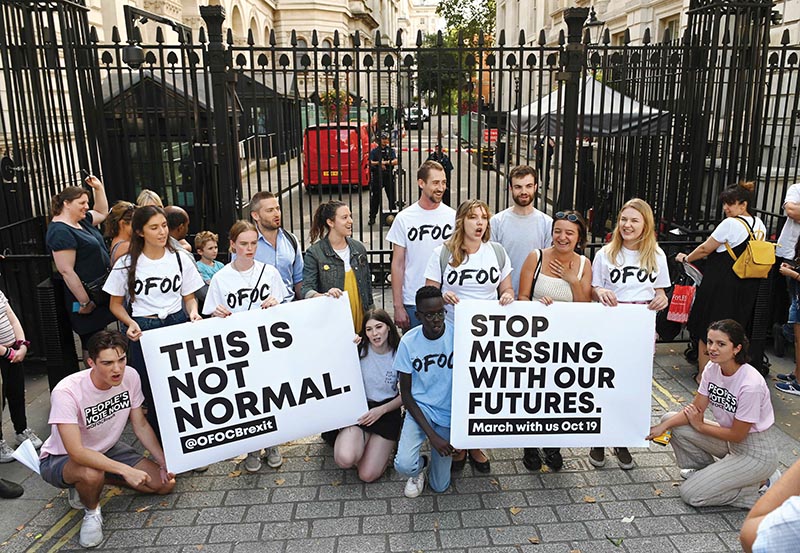
LONDON: Prime
Minister Boris Johnson yesterday announced the suspension of parliament in the
final weeks before Britain's EU departure date, enraging anti-Brexit MPs. The
pound slid on the surprise news, which opponents branded a "coup" and
a "declaration of war", although US President Donald Trump weighed
into the row by praising Johnson as "great". The Conservative
leader's move to close parliament for a month will give pro-EU lawmakers less
time than they expected to try to thwart his plans for a possible no-deal
Brexit on Oct 31.
Queen Elizabeth
II has approved the request to close what has been the longest session of
parliament in nearly 400 years, and reopen it on Oct 14 setting out Johnson's
fresh legislative program. Seemingly caught on the hop, incensed anti-Brexit
MPs were left scrambling for a way to stop the move. Johnson's announcement
came after six opposition parties said on Tuesday they would first seek to
legislate to prevent leaving the EU without a deal when parliament returns from
a summer recess next week.
Jeremy Corbyn,
the leader of the main opposition Labour Party, has said he wants to call a
vote of no-confidence in Johnson's government, which commands a majority of
just one seat. John Bercow, the speaker of parliament's lower House of Commons,
described the closure as a "constitutional outrage" designed to
stymie debate on Brexit, with Britain currently on course to crash out without
a divorce deal.
An EU summit on
Oct 17-18 could decide whether Britain ends its four decades of membership
without a withdrawal agreement that governs future trade relations and
citizens' rights. Johnson said there would be "ample time" either
side of the summit for MPs to debate Brexit. And he said it was
"completely untrue" that the move was designed to stop MPs blocking
his Brexit strategy. Johnson said it was to "bring forward a new, bold and
ambitious domestic legislative agenda for the renewal of our country after
Brexit". The government's chief Brexit adviser David Frost was in Brussels
for talks yesterday.
In the seismic
2016 referendum on Britain's EU membership, 52 percent voted in favor of
leaving the bloc, a result that has left parliament and the country bitterly
divided. Johnson insists Britain must leave on the Oct 31 deadline - already
twice-delayed - with or without a divorce deal from Brussels. Parliament has
rejected three times the withdrawal agreement struck between Brussels and the
government of Johnson's predecessor Theresa May.
Parliament
typically goes into recess again around the annual party conference season,
which kicks off on Sept 14 and ends on Oct 2. Bercow, who was not forewarned
about Johnson's suspension decision, said: "It is blindingly obvious that
the purpose of prorogation now would be to stop parliament debating
Brexit". "Shutting down parliament would be an offence against the
democratic process."
The pound slumped
more than one percent at one stage, but shares rose as London-listed
multinationals stand to gain from a weaker currency. Johnson's move
"certainly caught markets off-guard", noted Craig Erlam, senior
market analyst at Oanda. Corbyn called it "an outrage" and a
"smash-and-grab on our democracy in order to force through a no-deal
exit", while Labour's finance spokesman John McDonnell branded it a
"coup".
Liberal Democrat
Brexit spokesman Tom Brake tweeted: "The mother of all parliaments will
not allow him to shut the people's parliament out of the biggest decision
facing our country. His declaration of war will be met with an iron fist."
Lib Dem MP Sarah Wollaston said Johnson was "behaving like a tin pot
dictator". Robert Craig, a constitutional expert at Durham University,
said there was "theoretically absolutely nothing wrong" with the
suspension, noting it was normal for a new leader to start a fresh
parliamentary session. "But the reason that it is causing outrage is
because it's reducing the number of available days for parliament to stop a
no-deal."
Analyst Maddy
Thimont Jack, from the Institute for Government think-tank, said the timing was
controversial. "I don't think it's a constitutional crisis," he told
AFP, adding: "Stopping no-deal is definitely still possible. There is
still time." A petition against the move has already collected around
350,000 signatures, meaning it will be debated by MPs. More than 70
parliamentarians have also launched a fast-track legal bid at the highest civil
court in Scotland, aimed at preventing Johnson from suspending parliament. -
AFP










